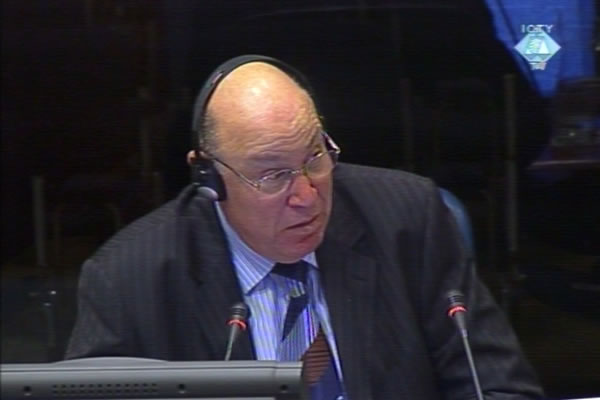Home
KARADZIC COUNTERS VIDEOS WITH HIS OWN FOOTAGE
In the opinion of Egyptian general Hussein Ali Abdel-Razek, the Bosnian Serb political and military leaderships had identical goals, and worked hand in hand, but the politicians, including Karadzic, were in charge at the meetings when the shelling of Sarajevo and the expulsion of Muslims were discussed. With the help of Lord Owen Karadzic tried to show that there were no ‘good and bad guys’ in BH
 Husein Ali Abdel-Razek, witness at Radovan Karadzic's trial
Husein Ali Abdel-Razek, witness at Radovan Karadzic's trial As the trial of Radovan Karadzic continues, the prosecution tendered into evidence the statement General Hussein Ali Abdel-Razek gave to the prosecution in July 2002 for the trial of General Stanislav Galic. From 21 August 1992 to 20 February 1993, the Egyptian general was the commander of UNPROFOR in Sector Sarajevo.
In a brief examination-in chief Razek said that the Bosnian Serb political and military leadership had identical goals, that they ‘worked hand in hand’, but the politicians were in charge. By way of an example, Razek said that Biljana Plavsic regularly attended his meetings with the SRK commander Stanislav Galic. Plavsic spoke on behalf of the Serb side while General Galic and other military officers joined the conversation now and then, when military issues were discussed.
Razek then spoke about the reports about the shelling and sniping in Sarajevo. He often had to protest against those incidents to Galic. In the talks with the political leadership – sometimes with Karadzic in attendance – the expulsion of the Muslim population was one of the main topics, Razek said. According to him, the Serb leaders and Karadzic often said that ‘it was impossible to live with them [Muslims]’ showing the maps with the demarcation lines between Serbs and other ethnicities in BH.
Today the prosecution showed a recording of a meeting in Pale, when Lord Owen accompanied by generals Razek and Morillon spoke to Karadzic, Mladic and Koljevic of his ‘very depressing impressions’ from a Sarajevo hospital damaged by shells. The prosecution then played a recording made by TV Pale, in which Karadzic accused the ‘Muslim troops’ of opening fire from artillery pieces positioned in skyscrapers to force the Serb side to respond. Karadzic also said that Muslim troops set explosives in the streets and killed their fellow citizens to blame Serbs for those incidents.
Razek said about the videos that during his stay in Sarajevo he ‘neither saw nor heard’ of any artillery pieces positioned in skyscrapers, adding that it didn’t seem to him to be a ‘practical’ and ‘professional’ solution. Razek said he could not ‘imagine setting explosives in the streets’, noting that all sides made a lot of ‘claims and counterclaims’ he was unable to verify during his stay in Sarajevo.
After the prosecution showed its tapes, Karadzic responded by playing extracts from the movie An Avoidable War, directed by American director of Serb descent, George Bogdanich. In the movie, Lord Owen says that a propaganda war was underway in BH, with one side painting itself as the ‘good guys’ and the other as ‘bad guys’ for the benefit of the American viewers, used to the ‘cowboys and Indians’ stories.
When Karadzic asked if the Serbs lost the propaganda war because of ‘the media partiality’, Razek said he personally always tried to give a chance to every side to put forth its views. Razek reminded Karadzic that he himself had suggested to CNN journalist Christiane Amanpour to interview Karadzic. ‘I remember I told her it seemed Karadzic was indeed a bad guy, but that she should nevertheless hear what he had to say’, the witness explained.
The trial continues tomorrow.
